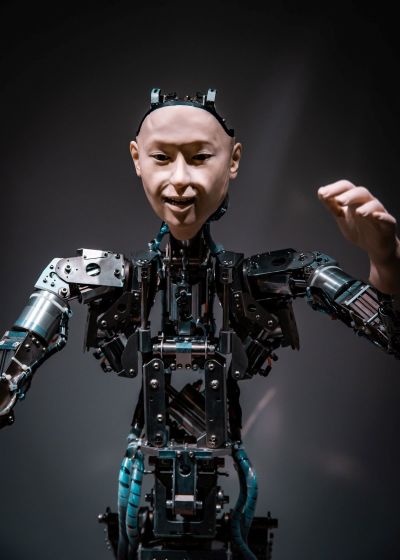Preparing for the AI tsunami: Stages in civilization (part 2)

Are we ready for the AI tsunami?
Probably not since the major concern is in a category of life and society that many consider irrelevant: The spiritual.
Sam Leith, a British commentator on society and culture, may not agree that the problems are spiritual, but he does think that modern economies “are built on addiction,” and that they “seek to “exploit bad behavior.”[1]
Were Pitirim Sorokin alive he would not be surprised. Sorokin was a major twentieth-century sociologist who discerned stages in civilization. The ideational stage of a culture is one of aspiration and the quest for the highest principles. In the idealistic phase of society, there is greater integration of spiritual and material domains, prompted by reason.
Sorokin, whose ideas gained credence in the 1960s, might concur that our culture is in what he called a sensate phase. The material and experiential displace the spiritual basis of society. In this stage, thought Sorokin, feelings dominate and constitute the highest value and quest.
There was also a pattern of stages in Old Testament Israel, seen in the Bible books of Joshua and Judges. In the Ratification era, the influential groups that form cultural consensus are in agreement that the Lord who has revealed Himself to Moses and the prophets is the Lord of their nation and its society.
Then a new generation arises that rejects those old values, and the society slides into a Relapse (of memory) period when the consensus shapers and people at large forget God and the worldview of the previous generation.
This sparks an age of Rebellion when the contemporary generation willfully casts off and turns away from the old values.
The Refiner’s Fire period soon envelops the society as the people and their institutions experience the consequences of the Rebellion stage.
Now comes a season of Remembrance, when thinking people within the society begin to wonder what went wrong... what was lost... what had to be recovered.
Prophets rise up in this era, and are renounced and marginalized, but not before a remnant of society embraces their declarations.
Now comes an era of Repentance when many in that remnant portion of the culture turn away from Rebellion and seek a new consensus based on revelation, and thus leading the society back into the original Ratification stage.
This seems to describe America and much of the West in this age. The “consensus establishment” is comprised of the elites of Information, Entertainment, Academia, Governance/Politics, and Corporations. These have actually led to the assault on the old worldview and its values.
Sorokin would likely say that we began the slide into the Sensate in the twentieth century and that we are now into it deeply. In the Old Testament Israel cycle, many cultures seem to be in a Rebellion phase and slipping into the Refiner’s Fire period.
To return to the tsunami metaphor, the building surf that has given us much pleasure is mounting into a rushing flood that could drown us.
Ages ago the Apostle John saw a vision warning of a future period when people would be vulnerable to the pharmakia, the intoxicating seductions that would abound in that period. Every imaginable sensation would be available at one’s fingertips in such a time as that.[2]
The appeal to “bad behavior” is a powerful antagonist of moral living, a vital concern of applied spirituality. It is a large product pushed and delivered through the internet and its dazzling machines.
Without an understanding of God’s transcendence, there seem to be no limits to the stimuli for “bad behavior” that is already at catastrophic levels.
Mitzi Purdue, writing in Psychology Today, notes that porn sites have more traffic than Netflix, Amazon, and Twitter combined. “Children are learning that sex means violence, degradation, and humiliation.”[3]
It is no wonder that the title of her article is “Pornography: The Public Health Crisis of the Digital Age.”
Who can address this crisis? It is neither science nor government. True science is the quest for knowledge no matter where it will take us. Science will go where it will. To impose boundaries on the technical advances that have brought great blessing but have also become tools for the pharmakia of what the Book of Revelation reveals as the “Babylonian” world system is an act of naivete. That is, no amount of censorship or prohibition will stop the research and development of AI.
Just as learning about the atom’s potential uses brought us the horror of the atomic bomb, so it gave us the blessings of advanced medical resources for dealing with diseases that quickly kill.
In this sense, we are at a crossroads like that Einstein faced when he learned of the development of atomic research that could lead to history’s most destructive weapons.
I describe this in my book, Who Will Rule the Coming ‘gods’... The Looming Spiritual Crisis of Artificial Intelligence.
On July 12, 1939, Hungarian physicists Leo Szilard and Eugene Wigner came motoring up the driveway at Einstein’s rented retreat on Long Island. They persuaded Einstein to write President Roosevelt, warning him of the dangerous potential of an atomic bomb.
This intensified nuclear research led to the device that ended the Second World War, saving thousands of troops who would have had to stage land invasions, but devastating people in the target zones.
Who can be the “Einstein” of our age that sounds the alert about the grim (as well as promising) potentials of AI for a “sensate” age that has largely disconnected from its spiritual and moral moorings?
The answer: the Church whose beliefs and worldview are biblically based and shaped. That will be the topic for Part III of this series.
[1] The Modern Economy is Built on Addiction - American Moment
[2] See Revelation 18
[3] Pornography: The Public Health Crisis of the Digital Age | Psychology Today
Wallace Henley was born two days before the attack on Pearl Harbor on December 5, 1941. After serving as a White House aide during the Nixon administration, Henley went on to become an award-winning journalist for the Birmingham News in Alabama. He is the author of more than twenty books, including God and Churchill with Jonathan Sandys, Winston Churchill’s great-grandson. Henley has led leadership conferences around the globe. He has been married to his wife, Irene, for more than fifty years. They have two children, six grandchildren, and four great-grandchildren. His latest book, Two Men from Babylon: Nebuchadnezzar, Trump, and the Lord of History, is available wherever books are sold.



























